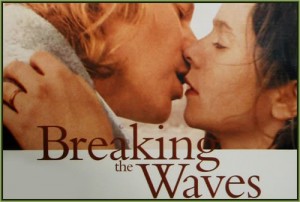celluloid relapse: breaking the waves

In this new column, ‘Celluloid Relapse’, Amy Miniter will be revisiting the earlier creations of established directors.
____
Lars von Trier, it seems, was born to push boundaries. An interesting character even from his earlier days, he has of late solidified his reputation as one of cinema’s veritable enfants terribles. Well known for his bouts of widely publicised outbursts, various manifestoes and own brand of increasingly controversial cinema, his latest film Melancholia (2011) is soon to be released here amid a profound collective thirst. In times such as these we ought to tread carefully; it is markedly easy, excited as we are, to allow a reputation and newer achievement to obscure what has come before. Due to the nature of time, past releases are easily lost and von Trier’s 1996, first non-Danish venture, Breaking the Waves, is one such example. Fallen by the wayside and outshone by shinier, newer siblings it is one film that we simply must not forget. One that pushes as many boundaries ideologically as it does aesthetically, this is magnificent piece of work and one that we will revisit here, albeit briefly.
Set in an isolated and conservative northern Scottish Calvinist community, this is the story of Bess McNeill (Emily Watson) and her brief yet passionate marriage to Jan Nyman (Stellan Skarsgård – father of a certain Alexander). What seems like mere weeks after their wedding, Jan is obliged to return to work on an isolated rig leaving the mentally unsound Bess utterly bereft. Wracked by terrible outbursts of sorrow, screaming and tantrums, she prays desperately for his return and perversely, God – or fate – answers her pleas. Injured in an accident, Jan returns to her a quadriplegic and gravely ill. As he lies decomposing in hospital, altered by drugs and sorrow, the impossible is asked of Bess. He demands that she ‘take a lover’ and surprisingly, she complies. From thereon in, her quest to satisfy Jan’s requests leads her on a downward spiral to excommunication, erosion of self and to the film’s terrible yet incredible conclusion where all, it seems, is certainly lost.
Aesthetically, thematically and otherwise, Breaking the Waves is an exceptional film but of course not one without its share of limitations. An “impressive but flawed epic” in the eyes of David Stratton, it was released to resounding critical acclaim, earning Cannes’ Grand Prix and a score of further nominations and prizes. Whilst not a true Dogme95 film and part of von Trier and Vintenberg’s anti-Hollywood movement, it was produced nonetheless adhering to a certain few of the manifesto’s guidelines and subsequent camera work; hand-held filming, grainy cinematography and lack of clarity could potentially alienate those of its audience accustomed only to technically faultless Hollywood creations. Despite this, von Trier manages to capture a very perfect and particular beauty in his characters and landscapes. The blithe Bess flits throughout the film as a pure soul of genuine, loving intentions against a backdrop of savage and very tangible beauty. The portrayal of the human condition is certainly this film’s greatest achievement and every element of its being – actors, script and otherwise – contribute magnificently.
This is a feature more confronting and troubling thematically than it is technically. Portraying the female not only as inferior but exterior to a patriarchal reality, its unorthodox heroine is the film’s desperate martyr as she desperately hurls herself against various barriers. Inch by inch, Bess struggles for change and to fulfill the wishes of her love, but in perfect vain. She is a catalyst for reform but alas, her progressive transgression of socio-religious values earns her no benefit as her condition decays into that of a sacrificial victim. At the conclusion reform may well be imminent, but in no way does Bess stand to benefit from this. Her fate is arguably one of a woman trapped by the whims of a masculine dominated social reality, despite all her attempts at the contrary.
Six months after its Cannes premiere the prospect of seeing Melancholia finally looms closer, and in the midst of our excitement (or otherwise) let us not forget its predecessors. Breaking the Waves was one of von Trier’s earlier and considerably less mainstream releases; understandably it received far less public attention and promotion than warranted now by its infamous director. Some fifteen years later it is still only viewed by those of us who actively seek it out. I would not go so far to say that this is one of history’s ‘great films’; the rapture I felt upon watching it for the first time was, it seems, a more personal resonance. It is, nonetheless, a film of substantial merit that we certainly ought to revive, in order to remember what we collectively have forgot.

